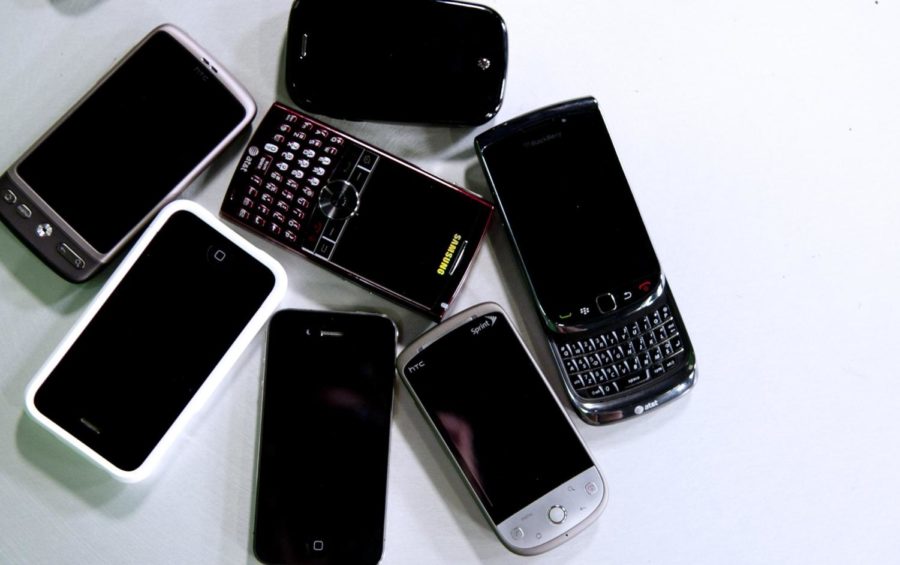Stanley: Replica phone manufacturers sacrifice quality and morality
Photo courtesy of Ariana McLaughlin
Generic smartphones of BlackBerry, iPhones, and Android phones.
May 17, 2018
Cell phones have become one of the most ubiquitous sights in our interconnected society — they are one of the most versatile tools for both business and everyday life.
With the astronomical prices that even mid-range name brand phones are, however (a new, unlocked iPhone 7 costs $549 when purchased from Apple, and a Samsung Galaxy S7 costs $399 from Walmart), there is a rapidly expanding market for low-cost cellular devices.
Enter Goophone, a manufacturer of smartphones, tablets and smartwatches based in Shenzhen, China.
Goophone is one of various Chinese and Thai electronics manufacturers that are creating knockoffs that look almost exactly the same for half the price. Their products can be easily found on almost any wholesale website — for example, the Goophone i7 (the knockoff version of the iPhone 7) costs only $71.25 on DHgate.com, a popular supplier.
Cheap lookalikes, nearly indistinguishable from the authentic product, for a fraction of the cost — sounds perfect, right? Not exactly.
First of all, there is the issue of the internal components — after all, with a $470 price difference, some corners have obviously been cut; the drop in quality, however, is steeper than most believe.
A major component that falls short in the Goophone i7 is the CPU itself. The iPhone 7 harnesses the A10 Fusion, which was designed by Apple and is manufactured by TSMC in Taiwan. This high-end processor costs a staggering $429 at Walmart, while the MediaTek MT6580 (the CPU utilized by the Goophone) is a modest $80.
The A10 Fusion fully warrants its steep price, however, handily outperforming its Chinese competitor in almost every specification. The clock speed, which is an indicator of how fast the processor is able to perform tasks, sets the tone, with the Apple chip performing at an impressive 2.34 GHz while the MediaTek processor comes in at 1.3 GHz.
Other numbers back up this suggestion that the maximum speed of the A10 is superior, boasting six CPU threads to the MT6580’s four and a front-end width of six over a measly two.
Because of its relatively weak processor, the Goophone also loses some important features. Apple’s quad-core construction is designed with two high-capacity cores and two other low-power cores, meaning that a judicious user can assign simple tasks to the low-power cores to conserve battery.
However, not only do the Goophone processor’s four cores all run at the same speed (meaning that power-saving mode is not an option!), the speed they clock in at is barely higher than that of the Fusion’s low-power cores.
This is just the tip of the iceberg when it comes to the Goophone’s deficiencies. The iPhone’s resolution is 1334 by 750 pixels while the Goophone’s is a measly 960 by 540; the iPhone has 128 GB of storage while the Goophone only has 4 GB; the iPhone’s camera is a staggering 12MP while the Goophone can only claim 5MP; the list goes on and on.
Goophone has also been the subject of some worrying legal and ethical controversies in the past.
In 2012, Goophone used leaked images of the iPhone 5 found online to patent an iPhone 5 design in China before Apple could.
They went so far as to aggressively threaten legal action against Apple — while no suit was filed, in no small part due to a provision in Chinese intellectual property law protecting any designs which “[have] been publicly disclosed in publications in the country or abroad”, it was only one incident in a growing series of patent infringement cases involving Apple and Chinese manufacturers.
With China having long overtaken the United States as the world’s largest smartphone market — and with India in second — imitation is becoming more and more of a concern. Manufacturers of these knockoffs can sell them in bulk to unscrupulous street vendors and electronics stores in China and India for sale with an enormous markup, taking advantage of unsuspecting customers.
In fact, the presence of Goophones and other imitations on wholesale sites like DHgate indicate this is already taking place.
Not only are Goophones and other knockoff phones low quality products, the manufacturers use ethically dubious practices to obtain their designs. The market for low-cost phones contains so many other options — reputable manufacturers like Huawei and Honor provide comparable quality to brands like Samsung and LG for a fraction of the price.
Goophones also offer none of the security features that Apple and Samsung offer built into their operating systems; in fact, with how unethical their practices have been, it would be wise to check for invisible malware, spyware, and adware that have been installed in their place.
So next time an ad pops up for something that looks like a Galaxy S7 for $60, just remember the old maxim: if it looks too good to be true, it probably is.







